
The Reserve Bank of India (RBI) is advancing the development of its central bank digital currency (CBDC) by expanding the scope of both retail and wholesale digital rupee pilots, as outlined in its Annual Report for 2024–25. This strategic move aims to enhance financial inclusion, increase adoption, and solidify India’s leadership in digital payments.
As part of this expansion, the RBI is exploring critical innovations such as programmability and offline functionality. These features are expected to unlock new avenues for digital transactions, particularly in regions with poor internet connectivity. Programmable CBDCs could also enable tailored payment solutions for specific purposes like government subsidies and corporate expense management, thereby offering greater control and transparency in fund usage.
Retail and Wholesale CBDC Pilots Gain Momentum
The RBI’s ongoing pilots for retail and wholesale CBDCs continue to gather traction. The retail CBDC, currently being tested with select customers and merchants through participating banks, has already reached 600,000 users across 17 banks. To boost adoption, the central bank has permitted certain non-bank entities to offer CBDC wallets, expanding accessibility and driving innovation in the digital currency ecosystem.
On the wholesale side, which focuses on interbank transactions, the pilot has garnered growing interest from institutional players. According to the RBI report, the program’s scope has been broadened with the inclusion of four standalone primary dealers (SPDs). This expansion aims to evaluate the potential of wholesale CBDCs in enhancing the efficiency of the financial market infrastructure.
India Leads the World in Real-Time Digital Payments
India’s digital payment landscape continues to thrive. During the financial year 2024–25, digital payment volumes surged by 34.8%, while their value increased by 17.9%, underlining a nationwide shift toward cashless transactions.
The RBI highlighted India’s global dominance in real-time payment systems, led by the Unified Payments Interface (UPI). UPI accounted for a staggering 48.5% share of global real-time payment transactions by volume, firmly positioning India as a frontrunner in digital financial innovation.
To further expand digital inclusion, the RBI introduced several user-centric features. Notably, the “Delegated Payments” function was launched, allowing a primary user to authorize a secondary user to conduct UPI transactions within a specified limit. This feature empowers individuals with greater flexibility and control over digital transactions, especially for family or employee-related payments.
Supreme Court Urges Action on Crypto Regulation
In a significant development, India’s Supreme Court has voiced concern over the lack of a clear regulatory framework for cryptocurrencies such as Bitcoin. On May 20, Justice Surya Kant called attention to the government’s delay in formulating regulations, despite enforcing a 30% tax on crypto gains since April 2022.
Justice Kant criticized the emergence of a “parallel economy” driven by unregulated digital assets, warning that it could undermine the stability of India’s formal financial system.
Despite regulatory uncertainty, India is home to an estimated 100 million crypto holders, making it one of the largest markets for digital assets globally. The continued growth of this sector highlights the urgent need for a cohesive and secure regulatory approach to safeguard investors and the broader economy.
Source Link
Author: Sb
ARK cuts Coinbase again with $22M sale as Bullish position grows
February 9, 2026
Comments are closed.
More News
-
Alchemy Partners with Cross Finance to Power dApp Development
September 13, 2024 -
Bitcoin Safe from $60K Dip
November 16, 2024
Bitcoin News
-
ARK cuts Coinbase again with $22M sale as Bullish position grows
February 9, 2026 -
JPMorgan Launches First Tokenized Money Market Fund on Ethereum
December 16, 2025
Most Viewed
-
ARK cuts Coinbase again with $22M sale as Bullish position grows
February 9, 2026 -
JPMorgan Launches First Tokenized Money Market Fund on Ethereum
December 16, 2025











